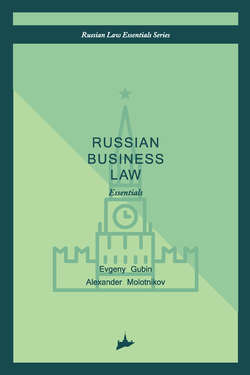Читать книгу Russian business law: the essentials - - Страница 12
Evgeny Arkhipov[15]
Chapter 1 – Business Legislation
2. The Constitutional Basics of Entrepreneurship
ОглавлениеThe Constitution of the Russian Federation is at the top of the pyramid of the acts, and it regulates entrepreneurship. It was adopted by national vote on December 12, 1993.
2.1. The Legal Features of the Constitution
The main legal features of the Constitution are specified in part 1 of Article 15 of the Constitution of Russia:
2.1.1. The Highest Legal Force
The highest legal force of the Constitution means that its norms have a priority over the norms of any other legal acts acting in the territory of Russia. All other acts shall correspond to the Constitution. If a norm enshrined in a federal law contradicts with the provisions of the Constitution, the norm of the Constitution shall apply.
2.1.2. The Direct operation
The direct operation of the Constitution means that it is possible to directly refer to its norms for the purposes of legally justifying one’s position.
2.1.3. The Application in the Whole Territory of Russia
Despite the fact that republics, which are also called «states» in the Constitution, are part of the Russian Federation, the Constitution also acts in the territory of these subjects of the federation, without any exceptions.
2.2. The Main Provisions of the Constitution, Regulating the Entrepreneurial Activities
In the Russian Federation:
i. Freedom of economic activity is provided (Article 8),
ii. The unity of economic space, free movement of goods, services, and financial means are guaranteed (Article 8),
iii. The support for competition is guaranteed (Article 8), the activity aimed at monopolization and unfair competition is forbidden (Article 34),
iv. The equality of private, state, municipal, and other forms of ownership is established (Article 8),
v. The possibility of finding of land and other natural resources in a private property is guaranteed (Article 9),
vi. The equality of all people before the law and the court is guaranteed (Article 19),
vii. Everyone has the right to free use of his abilities and property for entrepreneurial and other economic activity, not prohibited by law (Article 34),
viii. No one may be deprived of one’s property, with the exception of a court decision. Forced confiscation of the property may be carried out only for state needs, on conditions of preliminary and complete compensation (Article 35),
ix. Everyone has the right to state compensation for the damage caused by unlawful actions (or inaction) of bodies of state authority and their officials (Article 53).
